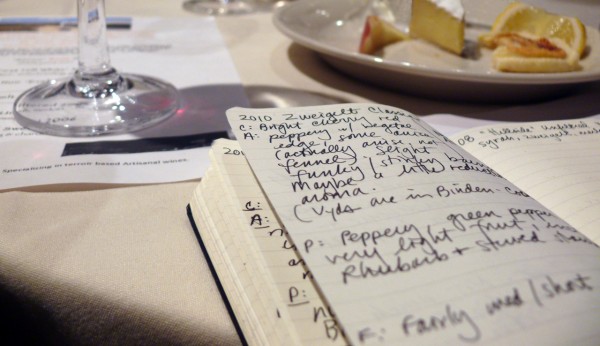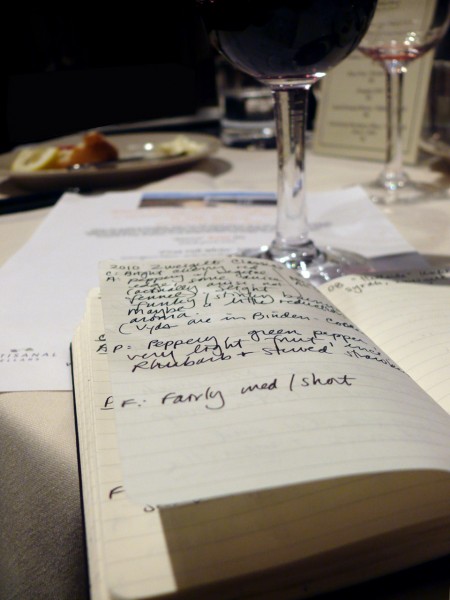Wine writers love to talk about wine writing. They love to talk about why they do it, who’s doing it, who’s doing it well, who’s doing it badly, the right way to do it, the wrong way to do it, whether it matters, whether casual writers (“bloggers”) are as influential as serious writers (“writers”), how to write tasting notes, whether to write tasting notes, whether tasting notes matter.
Rarely (ever?) do wine writers write about how to get better at writing, and what they’re doing to become a better interpreter, advocate, and muse to wine-curious, wine drinking readers. There’s a symposium for wine writers, and guilds and circles and groups. But writers don’t, for the most part, write about the craft itself, place themselves within a milieu, or ruminate extensively on what it might take to transform their prose into meaningful, substantial, new thinking about wine.
I spend a lot of time thinking about this. Admitting I need to become a better writer is probably self-sabotage in the cliquey world of wine writers. If nobody else thinks aloud that they need to grow, but I do, does it look like weakness?
But everyone is growing. We’re writing books, going pro, ditching point scores, adopting point scores, ditching blind tastings. We’re moving on to reach a trade audience, or to become absorbed into a winery as a marketing writer. We’re writing for travel mags, golf mags, parenting mags, and—other mags. We’re trying to work out how wine fits into culture, and what to say about that phenomenon. And we’re all reading and learning from each other.
All of these different types of writing require a different voice, audience, approach. Writers must develop a purpose or vision about their writing and whom it’s for, and formulate a strategy for their publication (if they self-publish), their column, or the body of work they’re building as a corpus.
An identity develops organically, but it can also be fruitful to bring these questions to a level of consciousness: What are you compelled by, and why? What stories are you most driven to pursue? How will you tell the tale? If you do write tasting notes about wine, what’s your style? Do you provide information and context about a wine, winery, and winemaker? Or do you present your notes as evidentiary summary, with a recommendation and rating? Are you a wine critic, wine writer, wine journalist, wine blogger, or something else? And how has this changed for you over time?
I’m trying to formulate the approach and identity that feels right for me. I’m not really a journalist, and don’t consider myself a wine critic. I think of myself primarily as a creative nonfiction writer. I’m a writer first, wine writer second. My responsibility is to my reader, someone for whom wine occupies a very small part of daily consciousness. My audience is not the wine cognoscenti, but it is literate, thoughtful, engaged, humanistic, and curious about ideas.
I like writing about wine because it’s so damned hard to write about. I’m trying to get better at it. It’s a shifting target, changing as I learn and grow. I’m trying to bring my own practice to the level of consciousness.
Here’s a little of my thinking about it now:
- Every wine topic has already been covered by someone else, dozens of times. The best thing I can contribute as a wine writer is a fresh perspective and a new voice. Admittedly, on many days, it’s difficult to find value in this exercise. I must reach.
- Every story is about something other than the surface narrative. The story should use wine as a way to talk about something more fundamental. What is that story?
- The text and voice should say something about the subject even without saying it. Prime the reader for reading about sensual matters. Whet his appetite. Rich language helps buttress the notion that wine itself is rich, sensual, tactile, and sensorial.
- Write to the highest common denominator. Assume infinite intelligence without prior knowledge. Explain the material without encumbering the text or insulting the reader.
- Write fewer evidentiary pieces and more reflective pieces. Ruminate and trust my own ideas. But dig deep.
- Use the techniques of journalism to make each piece flawlessly factual, but still creative. Insert myself into the narrative to show the reader how I know what I know.
- The lens should be cultural, not wine-centric. Wine exists in culture, and rarely comes first. Put wine into context.
And right now, here’s what I’m reminding myself to do to learn more:
- Read broadly, especially creative and journalistic nonfiction. Examine the machinery of the pieces that affect me most.
- Experiment. Write a lot of different kinds of pieces for a lot of outlets and watch what happens. If it’s an online publication, review the stats, keyword referrers, and social spread to determine what’s connecting, not just what I think is connecting based on anecdotal evidence. A corollary: don’t write only articles that will be popular. Push myself.
- Ask for help. (I’m horrible at this.)
- Keep asking myself what’s working for both my readers and myself. Where do I want to go with this article, this series, this publication, this year?
- The wine writing of others is instructive, but it is not a complete instruction. Get outside the circle.
[author] [author_image timthumb=’on’]http://palatepress.com/wp-content/uploads/2012/02/MHMaker.jpg[/author_image] [author_info]Meg Houston Maker, MA, CSW, is a writer curious about nature, culture, food, wine, and place. Find her creative writing at Megmaker.com and essays on food and wine at Maker’s Table. Follow her on Twitter @megmaker.[/author_info] [/author]


